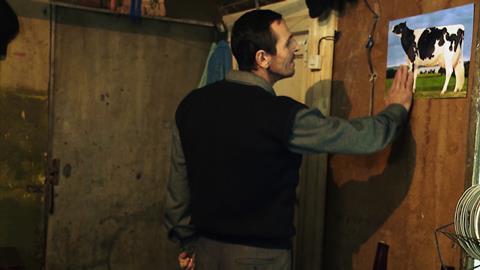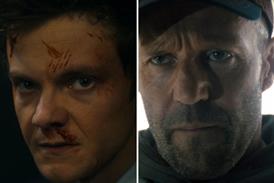Dir. Imam Hasanov. Azerbaijan, Germany, Romania, 2015. 72 mins.

Tapdyg is an unusual, very local hero. He’s a poor farmer living in the remote mountain village of Lahic in Azerbaijan in this slight, quietly captivating documentary from first-time director Imam Hasanov. His stand? He wants to buy a European cow because it will give him and his small family more milk. A Greek chorus of ancient village elders is aghast: “This cow is not suitable for our village!” they declare. “And you should be sent away too.”
Madona, indeed, proves to be something of a miraculous beast as she’s suddenly pregnant with no sign of any bull or even an insemination programme
Hasanov’s film, which competes in the debut strand at Amsterdam’s docfest IDFA, is a small but solid affair with potential appeal. The director, who received backing from Doha and Sundance amongst other funds, has difficulty stretching it to 72 minutes, and Holy Cow lacks a conclusion to match the strength of its first two acts. Nonetheless, this should prove a decent festival candidate.
“They think I’m going to start a revolution – unbelievable,” fumes Tapdyg in his shanty home. “I’m going to sell everything I have and buy that cow.”
First, however, he’ll have to over-ride his wife, who is very much against the purchase of said cow for fear of upsetting the neighbours. She doesn’t even want her husband to put a poster of the “European cow” – which looks like a Friesian – up on the thin cardboard walls of their freezing cold home in the foothills of the Caucasus mountains.
Lahic may be remote – Tapdyg has to walk into the hills to get a signal on his mobile phone – but the winds of change are coming. The Soviet Union is dead and Europe is the future, he thinks, and pretty soon, so does the local Iman. This “fantastic”, “cool”, “amazing”, “VIP cow” which Tapdyg has seen on TV and believes will bring a better future for his family, is the start of better times to come.
Holy Cow is at its strongest in the early sections, when Tapdyg sits alone at a table at the local tea shop, for example, shunned by his pals (“You’re hanging out with Europe now.”) Yet he doggedly saves and borrows – Hasanov’s camera watches the seasons change – to make the purchase price and the day finally comes when it’s time to make the big trip to purchase ‘Madona’, the “fantastic VIP” cow. Tapdyg excitedly gets dressed in his best suit, shaves and sprays himself with cologne to meet the creature who will change his destiny. Pretty soon his wife is complaining that he spends all his time with the cow.
Madona, indeed, proves to be something of a miraculous beast as she’s suddenly pregnant with no sign of any bull or even an insemination programme. Or, for that matter, a vet. And Tapdyg is quickly shown moving into better quarters, making cheese and buying clothes for his wife without any real sense of how Madona has single-footedly contributed to this remarkable shift in the family’s fortunes.
Still, even as the narrative rigor fades, there’s plenty here to take home, from a picture of the vanishing life in the Caucusus to the small town of Lahic and its gradual opening up to the outside world. The seasons pass, only marked by the changing of the local headgear, but things certainly aren’t staying the same. And Madona, a truly handsome beast indeed, placidly eats her way through Tapdyg’s stores, threatening the future comfort of her offspring with her European appetites.
Production companies: Fine Art, Kloos and Co, Conset Film
International sales: Rise and Shine, info@riseandshine-berlin.de
Website: www.holycowfilm.com
Producer: Andra Popescu
Cinematography: Sarvar Javadov
Editor: Philipp Gromov
Sound: Jalil Mamadov
Music: Le Trio Jourban
























